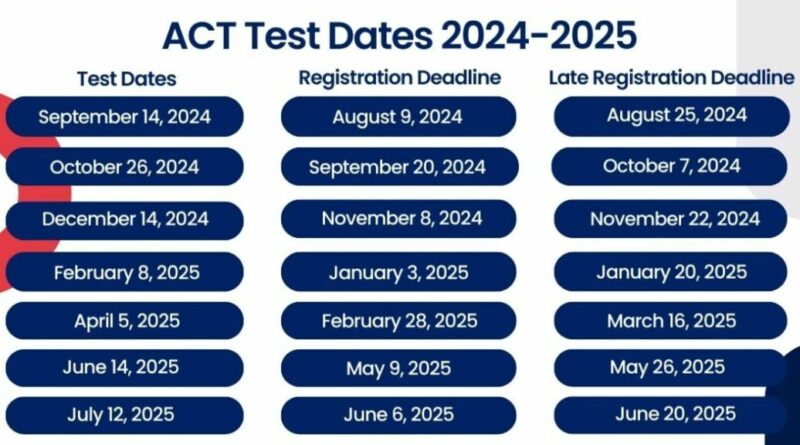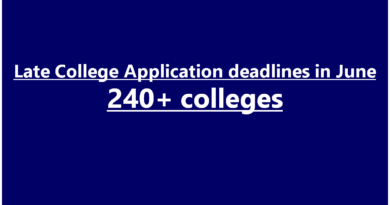When to Take the ACT: The Most Suitable ACT Test Dates
The ACT is a major milestone in the college application journey, often requiring extensive preparation to achieve a competitive score. Deciding the ACT test dates is crucial for maximizing your performance and aligning with your college and scholarship deadlines. This guide provides insight into common myths, important considerations for selecting test dates, and a recommended testing timeline to help you excel.
Myth: ACT Test Dates Are Curved by Competition
A common misconception is that ACT test scores are adjusted or “curved” based on the performance of other students who take the test on a given date. However, ACT scores aren’t curved. Instead, ACT, Inc. uses a process called equating to ensure that scaled scores represent the same level of ability, regardless of the test date. This means that your performance on the ACT is measured consistently, and your score reflects your ability regardless of when you take it. Complete ACT Schedule is available here.
Colleges do not consider test dates as part of their admissions criteria. Thus, a 28 on an April ACT is evaluated the same as a 28 on an October ACT. This standardization makes it easier for colleges to compare scores fairly and for you to focus on preparing to the best of your ability.
4 Key Factors for Choosing Your ACT Test Dates
Selecting the ideal ACT test date involves balancing multiple factors. Here are four essential considerations to guide your decision:
1. College Admission and Scholarship Deadlines
Your college and scholarship application deadlines play a significant role in determining when you should take the ACT. Most college application deadlines fall in December or January of senior year, meaning the final ACT you take should ideally be no later than December. For early decision or early action applicants, the deadline may be as early as October.
In addition to college admissions, many merit-based scholarships also have specific deadlines. Ensure you review all scholarship requirements and align your ACT schedule to allow for retakes if needed.
2. Content Readiness
The ACT covers math, reading, English, and science, with math being the most content-heavy. It’s beneficial to have completed Algebra II, Geometry, and introductory science courses before taking the ACT. Taking the test once these foundational courses are finished will better prepare you for the questions you’ll encounter, especially in the Math and Science sections.
3. Personal Commitments and Schedule
The ACT requires both mental and physical stamina, and it’s wise to choose a test date that doesn’t overlap with busy periods in your schedule. For most students, this means avoiding months packed with other exams, like AP tests or finals. Consider testing during less demanding periods, like the end of junior year (April/June) or early senior year (August).
4. Preparation Time
The amount of time you dedicate to ACT preparation is a critical factor for your success. Aiming for 40 to 80 hours of focused study time can yield substantial improvements. If you plan to take the ACT multiple times, a schedule that includes at least two months between test dates allows for dedicated study sessions to address weak areas.
Suitable ACT Test Dates for Most Students
For students following a typical preparation timeline, the following testing schedule may be ideal:
Step 1: Optional PreACT as a Sophomore
The PreACT is a good starting point and introduces you to the test structure.
Step 2: First ACT Attempt – February of Junior Year
Taking the ACT in February allows you to start preparing in January and establish a baseline score.
Step 3: Second ACT Attempt – April or June of Junior Year
After receiving your first ACT score, spend the spring semester improving in specific areas before retesting.
Step 4: Third Attempt if Needed – August of Senior Year
Taking the ACT in August gives you time to study over the summer and aim for a higher score if needed.
Step 5: Final Attempt (Optional) – October or December of Senior Year
For regular admissions, October and December are usually the last opportunities to achieve your target score.
ACT Testing Schedule for High-Achieving Students
For students seeking top ACT scores, a rigorous testing schedule may be helpful:
- Junior Year: Begin with the ACT in September or October and aim to complete three rounds of testing by June.
- Senior Year: August and October serve as last-chance dates to reach your highest potential score before final applications.
Conclusion
Choosing the best ACT test dates is about balancing preparation, deadlines, and personal commitments. By selecting the right dates and allowing yourself time to study, you can reach your best score and meet college and scholarship requirements. Good luck on your path to success!



